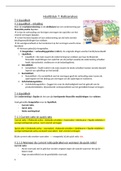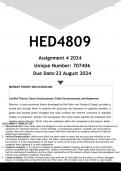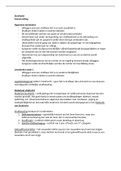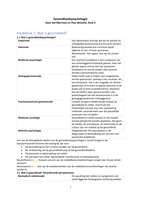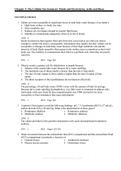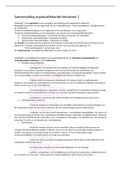The award
During this section of the work, we canvassed arbitration law and practice form several angles --. How it
developed, details for how matters are referred, included close analysis of the arbitration agreement & how
the tribunal will be appointed, Looked at the duties and powers of the tribunal, relationship with parties
and how it affects the conduct of proceedings. In our discussion, we have looked at mechanisms of ensuring
that the arbitration reaches its goals of being efficient and selective by looking at the tools for managing the
proceedings and the preliminary meeting. We also considered material aspects of the hearing itself. In final
session: Will be discussing the true crux of arbitration, the thing everyone is here for: A final and binding
award.
The time for making the award
• Section 23 of the Arbitration Act:
“The arbitration tribunal shall, unless the arbitration agreement otherwise provides, make its award-
• (a) in the case of an award by an arbitrator or arbitrators, within four months after the date
on which such arbitrator or arbitrators entered on the reference or the date on which such
arbitrator was or such arbitrators were called on to act by notice in writing from any party to
the reference, whichever date be the earlier date; and
• (b) in the case of an award by an umpire, within three months after the date on which such
umpire entered on the reference or the date on which such umpire was called on to act by
notice in writing from any party to the reference, whichever date be the earlier date, or in either
case on or before any later date to which the parties by any writing signed by them may from
time to time extend the time for making the award: Provided that the court may, on good cause
shown, from time to time extend the time for making any award, whether that time has expired
or not.”
In effect à This section prescribes a time period within which the award must be made
Summary:
• 4 months, unless agreement to the contrary
• Umpire: Tribunal must make award in 3 months.
• Time period starts when the arbitrator is being called to act / given written notice to act or
has entered on reference.
• What is meant by these terms? The arbitrator can only be called to act by formal appointment
• Note: Umpire may be appointed at the start of proceedings, but if an umpire is appointed form
the outset in agreement, they may only be empowered to perform their function at the end
of proceedings – when there is a deadlock.
• On this basis, in terms of section 23: An umpire will only be considered to becalled to act once
the dispute is referred to them for decision.
• When is the arbitrator called to act, v. the umpire?
• The arbitrator can only be called on to act once he or she has been formally appointed.
• When the umpire entered on the reference or the date on which he or she was called on to act
by any party to the reference, whichever is the earlier date
• “Entering on reference” =
• In the case of an arbitrator, previous position was: When arbitrators have reached the stage of an
enquiry, judicially or at the beginning of the hearing (moment they begin to hear) they would be
entered on reference HERE à Held in the Bester:
• Bester v Easigas (Pty) Ltd 1993: the arbitrator will enter into the reference at the start of the
evidentiary hearing
• Van Zijl v Von Haebler 1993 (SEC) 664E: “the date on which [the arbitrator] commences hearing
evidence or entertains submissions from the parties as to the conduct of the matter, other than
, the mere determination of a date [for the hearing].” – would be considered the ttime in which
they entered on referenceà Means that the moment the arbitrator had any involvement in
the proceedings (unlike Easygas where it was nly the moment where the evidentiary hearing
started, this decision – which came later is pushing the time period earlier à The moment in
which they started the function, they have entered on reference.
• EG: If there is a preliminary meeting where the arbitrator engages in case management, then the time
limit commences.
• What if the time limited expires?
We start to consider the position where the statutory provision that provided in section 23 expires. Can
expire sometimes through no fault of the arbitrator, but delays caused by the parties – can also be used by
party to delay the matter that the opportunity to give an award is no longer there (e.g. Sherwood).
Where the period for making an award has expired, a party has two options:
1) Formal agreement à Apply to court to extend the time limit under section 23
• Formal agreement – S23:“any later date to which the parties by any writing signed by them
may from time to time extend the time for making the award” (must be in writing PASA v
Roofing Guarantee (1989)); Held that an informal agreement is not sufficient to extend a time
period as contemplated in section 23, specifically a formal, written agreement is necessary
2) Application to court for order that the arbitration agreement should cease to have effect under section
3(2) – as discussed under Sherwood.
• By Court order (Bester v Easigas)
• On good cause shown
Time limit can be extended:
This is done where there is a formal agreement OR by order of the court.
NB note: Section 23 specifically contemplated that a WRITTEN agreement is required.
When can this power be exercised?
• Not only after the time for making the award has expired
• But after the award itself has been made (Bester Easigas)
• Why would we need this kind of provision? | Purpose of section 23:
• To encourage arbitrators to proceed to the stage of final award as quickly as the circumstances
permits.
• Example of provision within the AAct which aims to assist in efficiency
• The consequences of the time limit that expires seemed to not aid in the finality of the dispute
• Sherwood Eleven: Example of the fact that section 23 does not always suit its purpose. In this
case, the arbitrator did not need the encouragement to proceed with the arbitration – in fact,
the problem was with the claimant, as due to the fault of the claimant, the period had expired
even before the statement of claim had been received. One of the parties was blatantly
dragging his feet (read the case again in light of this discussion).
• The very first sentence of section 23 has the *magic* words for party autonomy à “unless the
arbitration agreement otherwise provides” ; gives the parties themselves the opportunity to
exclude this potentially problematic provision. Especially necessary given that the current
position does not seem too effective by truly placing pressure on the arbitrator.
• In practice, it is common to include a statement in an arbitration agreement which highlights
the time period applicable e.g. parties could include a clause in the agreement which says that
the award must be delivered within 14 days after completion of the hearing. The parties may
also include provision that says that the arbitrator must do all things necessary that the hearing
happens efficiently – therefore, you are creating a dual duty; you are not placing the arbitrator
to a time limit to get through to end of proceedings in a manner that might not be practically
possible.
, • Remember: Lecturer’s case where the parties had to resolve the dispute within a very short
span of time. That might not be the ind of exclusion of section 23 that would be practical.
• However, a time period on when the award must be delivered after conclusion of the hearing,
is definitely serviceable within the agreement à Coupling that with the duty to have the
arbitrator run their proceedings efficiently, would definitely be helpful in moving the
proceedings along.
REQUIREMENTS FOR A VALID AWARD
Formal requirements that section 24 sets out for valid award:
• S24(1): in writing and signed by all the members of the arbitration tribunal
What if the award goes against what you initially thought was your judgment? E.g. dissenting opinion
& you disagree with the rest of the tribunal, perhaps you might want to sign it? Would it be a great idea
for the minority view to allow for the invalidity of the award simply by refusing to sign it? No probably
not.
Fortunately the Act does not have such wide holes;
• S24(2): refusal to sign by the minority, the refusal must be mentioned in the award but it does not
necessarily invalidate it.
Substantive requirements
• The award must be certain, not ambiguous; parties must know exactly what they are doing and clear
guidelines must be set.
• The award must be final
Because of this a party cannot ask for absolution from the instance in the event that the claimant has
not proved all aspects of its claim & its case is so weak that the proceedings should not continue in their
view.
Irish v Kritzas: Final nature of the award was such that it ought not to allow the opportunity for the door
to ever be reopened, unless expressly provided for by the parties.
In other words: In a court where absolution is granted, the plaintiff can try again with an improved case.
This would be an opportunity to reopen the door to have the matter reventilated. In this case, this is
not an automatic remedy granted to the parties without an express agreement by the parties allowing
for absolution form the instance – due to the final nature of the award.
• The award must be practically possible
An award is no good if it cannot actually be enforced; it therefore logically follows that an award must
be:
• Lawful
Where a party is forced to do something against the law, a court will not enforce it.
• Intra vires
It must be within the arbitrators’ powers and jurisdiction
Does an award need to have reasons?
Note: That there is no requirement for the award to be reasoned; thus, reasoning is not a substantive
requirement for an award.
• Consider the English position as applied in Schoch v Bhettay (1974)
Courts applied the Englihs law and held that it is not required in SA Law that award be accompanied by
reasons. This principle made sense in English Law, as in England, courts have the common power to set
aside an award because of error in fact or law. That error could be present on a reading of an award
itself. The easiest way to get rid of this: Stop giving reasons.
However, this common law power has never been included in SA Law. The need for the English Law to
not give reasons should not exits,
• Compare with the UNCITRAL Model Law and AoA Rules 37:
During this section of the work, we canvassed arbitration law and practice form several angles --. How it
developed, details for how matters are referred, included close analysis of the arbitration agreement & how
the tribunal will be appointed, Looked at the duties and powers of the tribunal, relationship with parties
and how it affects the conduct of proceedings. In our discussion, we have looked at mechanisms of ensuring
that the arbitration reaches its goals of being efficient and selective by looking at the tools for managing the
proceedings and the preliminary meeting. We also considered material aspects of the hearing itself. In final
session: Will be discussing the true crux of arbitration, the thing everyone is here for: A final and binding
award.
The time for making the award
• Section 23 of the Arbitration Act:
“The arbitration tribunal shall, unless the arbitration agreement otherwise provides, make its award-
• (a) in the case of an award by an arbitrator or arbitrators, within four months after the date
on which such arbitrator or arbitrators entered on the reference or the date on which such
arbitrator was or such arbitrators were called on to act by notice in writing from any party to
the reference, whichever date be the earlier date; and
• (b) in the case of an award by an umpire, within three months after the date on which such
umpire entered on the reference or the date on which such umpire was called on to act by
notice in writing from any party to the reference, whichever date be the earlier date, or in either
case on or before any later date to which the parties by any writing signed by them may from
time to time extend the time for making the award: Provided that the court may, on good cause
shown, from time to time extend the time for making any award, whether that time has expired
or not.”
In effect à This section prescribes a time period within which the award must be made
Summary:
• 4 months, unless agreement to the contrary
• Umpire: Tribunal must make award in 3 months.
• Time period starts when the arbitrator is being called to act / given written notice to act or
has entered on reference.
• What is meant by these terms? The arbitrator can only be called to act by formal appointment
• Note: Umpire may be appointed at the start of proceedings, but if an umpire is appointed form
the outset in agreement, they may only be empowered to perform their function at the end
of proceedings – when there is a deadlock.
• On this basis, in terms of section 23: An umpire will only be considered to becalled to act once
the dispute is referred to them for decision.
• When is the arbitrator called to act, v. the umpire?
• The arbitrator can only be called on to act once he or she has been formally appointed.
• When the umpire entered on the reference or the date on which he or she was called on to act
by any party to the reference, whichever is the earlier date
• “Entering on reference” =
• In the case of an arbitrator, previous position was: When arbitrators have reached the stage of an
enquiry, judicially or at the beginning of the hearing (moment they begin to hear) they would be
entered on reference HERE à Held in the Bester:
• Bester v Easigas (Pty) Ltd 1993: the arbitrator will enter into the reference at the start of the
evidentiary hearing
• Van Zijl v Von Haebler 1993 (SEC) 664E: “the date on which [the arbitrator] commences hearing
evidence or entertains submissions from the parties as to the conduct of the matter, other than
, the mere determination of a date [for the hearing].” – would be considered the ttime in which
they entered on referenceà Means that the moment the arbitrator had any involvement in
the proceedings (unlike Easygas where it was nly the moment where the evidentiary hearing
started, this decision – which came later is pushing the time period earlier à The moment in
which they started the function, they have entered on reference.
• EG: If there is a preliminary meeting where the arbitrator engages in case management, then the time
limit commences.
• What if the time limited expires?
We start to consider the position where the statutory provision that provided in section 23 expires. Can
expire sometimes through no fault of the arbitrator, but delays caused by the parties – can also be used by
party to delay the matter that the opportunity to give an award is no longer there (e.g. Sherwood).
Where the period for making an award has expired, a party has two options:
1) Formal agreement à Apply to court to extend the time limit under section 23
• Formal agreement – S23:“any later date to which the parties by any writing signed by them
may from time to time extend the time for making the award” (must be in writing PASA v
Roofing Guarantee (1989)); Held that an informal agreement is not sufficient to extend a time
period as contemplated in section 23, specifically a formal, written agreement is necessary
2) Application to court for order that the arbitration agreement should cease to have effect under section
3(2) – as discussed under Sherwood.
• By Court order (Bester v Easigas)
• On good cause shown
Time limit can be extended:
This is done where there is a formal agreement OR by order of the court.
NB note: Section 23 specifically contemplated that a WRITTEN agreement is required.
When can this power be exercised?
• Not only after the time for making the award has expired
• But after the award itself has been made (Bester Easigas)
• Why would we need this kind of provision? | Purpose of section 23:
• To encourage arbitrators to proceed to the stage of final award as quickly as the circumstances
permits.
• Example of provision within the AAct which aims to assist in efficiency
• The consequences of the time limit that expires seemed to not aid in the finality of the dispute
• Sherwood Eleven: Example of the fact that section 23 does not always suit its purpose. In this
case, the arbitrator did not need the encouragement to proceed with the arbitration – in fact,
the problem was with the claimant, as due to the fault of the claimant, the period had expired
even before the statement of claim had been received. One of the parties was blatantly
dragging his feet (read the case again in light of this discussion).
• The very first sentence of section 23 has the *magic* words for party autonomy à “unless the
arbitration agreement otherwise provides” ; gives the parties themselves the opportunity to
exclude this potentially problematic provision. Especially necessary given that the current
position does not seem too effective by truly placing pressure on the arbitrator.
• In practice, it is common to include a statement in an arbitration agreement which highlights
the time period applicable e.g. parties could include a clause in the agreement which says that
the award must be delivered within 14 days after completion of the hearing. The parties may
also include provision that says that the arbitrator must do all things necessary that the hearing
happens efficiently – therefore, you are creating a dual duty; you are not placing the arbitrator
to a time limit to get through to end of proceedings in a manner that might not be practically
possible.
, • Remember: Lecturer’s case where the parties had to resolve the dispute within a very short
span of time. That might not be the ind of exclusion of section 23 that would be practical.
• However, a time period on when the award must be delivered after conclusion of the hearing,
is definitely serviceable within the agreement à Coupling that with the duty to have the
arbitrator run their proceedings efficiently, would definitely be helpful in moving the
proceedings along.
REQUIREMENTS FOR A VALID AWARD
Formal requirements that section 24 sets out for valid award:
• S24(1): in writing and signed by all the members of the arbitration tribunal
What if the award goes against what you initially thought was your judgment? E.g. dissenting opinion
& you disagree with the rest of the tribunal, perhaps you might want to sign it? Would it be a great idea
for the minority view to allow for the invalidity of the award simply by refusing to sign it? No probably
not.
Fortunately the Act does not have such wide holes;
• S24(2): refusal to sign by the minority, the refusal must be mentioned in the award but it does not
necessarily invalidate it.
Substantive requirements
• The award must be certain, not ambiguous; parties must know exactly what they are doing and clear
guidelines must be set.
• The award must be final
Because of this a party cannot ask for absolution from the instance in the event that the claimant has
not proved all aspects of its claim & its case is so weak that the proceedings should not continue in their
view.
Irish v Kritzas: Final nature of the award was such that it ought not to allow the opportunity for the door
to ever be reopened, unless expressly provided for by the parties.
In other words: In a court where absolution is granted, the plaintiff can try again with an improved case.
This would be an opportunity to reopen the door to have the matter reventilated. In this case, this is
not an automatic remedy granted to the parties without an express agreement by the parties allowing
for absolution form the instance – due to the final nature of the award.
• The award must be practically possible
An award is no good if it cannot actually be enforced; it therefore logically follows that an award must
be:
• Lawful
Where a party is forced to do something against the law, a court will not enforce it.
• Intra vires
It must be within the arbitrators’ powers and jurisdiction
Does an award need to have reasons?
Note: That there is no requirement for the award to be reasoned; thus, reasoning is not a substantive
requirement for an award.
• Consider the English position as applied in Schoch v Bhettay (1974)
Courts applied the Englihs law and held that it is not required in SA Law that award be accompanied by
reasons. This principle made sense in English Law, as in England, courts have the common power to set
aside an award because of error in fact or law. That error could be present on a reading of an award
itself. The easiest way to get rid of this: Stop giving reasons.
However, this common law power has never been included in SA Law. The need for the English Law to
not give reasons should not exits,
• Compare with the UNCITRAL Model Law and AoA Rules 37:

